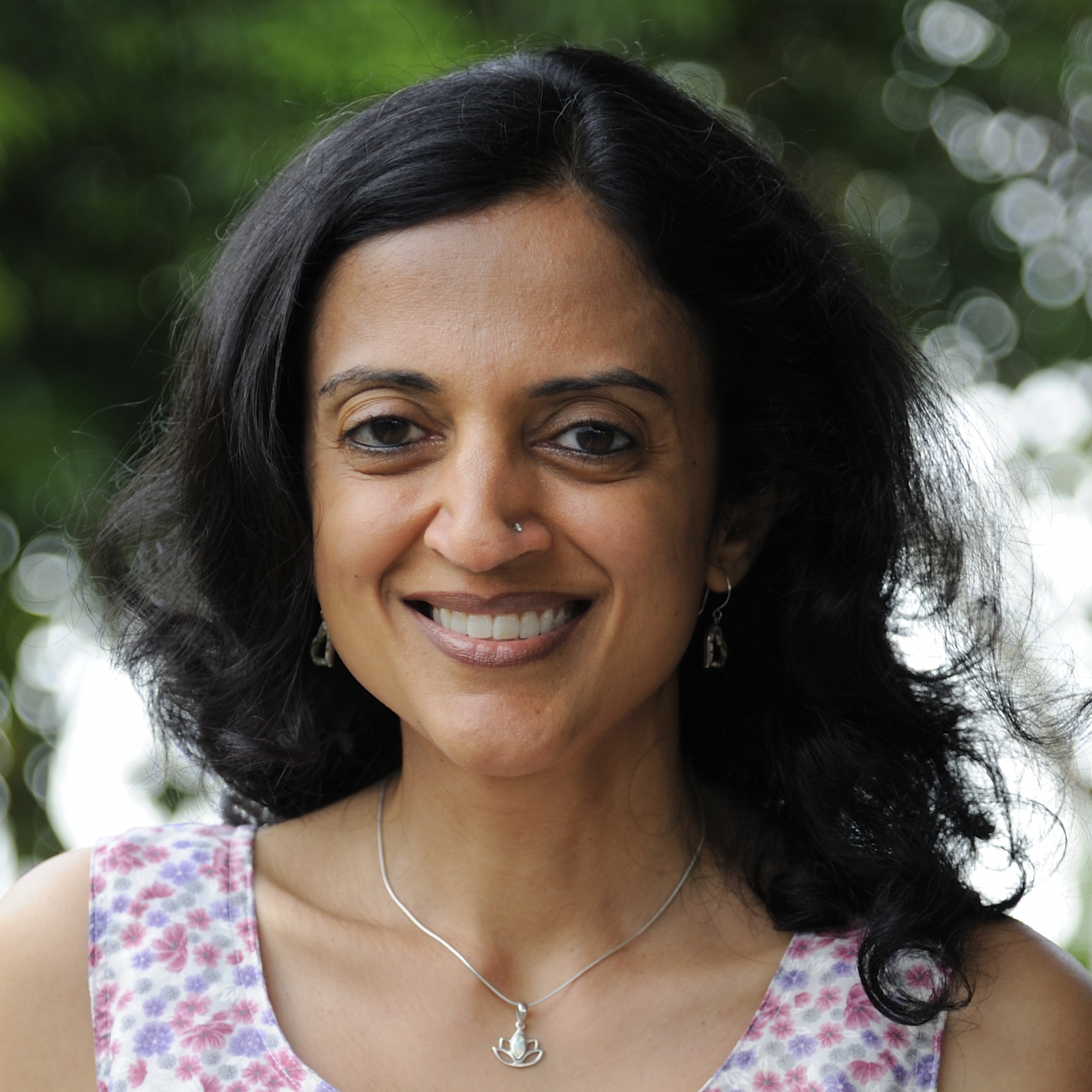Kaveri sits at the crossroads of contemplation, creativity, and compassion. She tries to parent, write, and facilitate healing for others and herself from this place. Her poetry books include An Invitation (2011), Under the Waves (2012), and The Voice (2014). Her meditation cd The Feminine Faces of Compassion was released in 2013 and her journal Be the Space: Reflections on the Journey was released earlier this year. She resides in northern California where she practices Family Medicine and teaches a meditation and writing class. She can be contacted at www.wisdominwaves.com
I discovered Dr. Kaveri at the Mindfulness4Mothers blog when my little one was a few months old and I was struck by a difficult phase of postpartum anxiety. Her words were incredibly comforting and I was inspired by her courage in being vulnerable and also how gracefully she is embodying a portfolio career. I have enjoyed reading her words around the web and am so glad kind people like her abound in our medical community. Here’s more of Dr. Kaveri for you:-) The poem at the end is an absolute heart warming, thought provoking gift!
-
How does living mindfully manifest in your life?
Buddhist teacher, author, and director of mindfulness education at UCLA’s Mindful Awareness Research Center, Diana Winston has a definition of mindfulness I resonate with. According to her, mindfulness is “paying attention to your present moment experience with openness, curiosity, and a willingness to be with what is.”
For me, living mindfully means that I need to be present, open, and care about what is actually happening in any given moment. The joyful moments are much easier to be with, to open my heart and feel connected to everyone and everything around me. The difficult moments aren’t so easy. I’m not willing to be with what is if I’m not aware of my thoughts, feelings, and body sensations. This can be tricky when I’m surrounded by others, which is why I need periods of silent space throughout my day to connect with my mind body and heart in ways that are deeply truthful and healing. Only then can I open again and actually sense what is needed by others.
The neutral moments are interesting to watch. Sometimes I zone out and get busy cleaning, organizing, or checking email to fill the space with something to do. The beauty of mindfulness is that I can always return to the present moment without judging where I’ve been. If I am self-critical, the practices of self-compassion and forgiveness are like soothing balms to any wound.
Living mindfully is perhaps most challenging in the context of relationships. Wise speech, paying attention to word choice, tone of voice, and my intentions behind the words, is often helpful in order to facilitate harmonious relationships. It is also a useful reminder when words have already been used as weapons and I’m trying to minimize further damage caused by them. Asking myself the question, who am I or what am I believing in a challenging interaction with someone is also quite informative. I can see all the ways I defend myself as a ‘good’ person and all the ways I blame myself as a ‘bad’ person. Neither version of me is accurate. The same question can be asked of others. Who are they? What am I believing about them?
-
What comes in the way of your making intentional, conscious choices and what brings you back on track?
Fear and guilt get in the way. I was raised in a culture that values the well being of the larger family unit over the yearnings of an individual. I also live in an area that values productivity over vulnerability. When I contemplate a career move, the creation of a new project, or crave alone time, fear and guilt arise. I fear separation from my family/colleagues and the loss of love, respect, and understanding that might follow. I also fear that there is only a finite amount of time to do all that I want to do. I feel guilty in prioritizing my callings over the needs of others.
Meditation, yoga, writing, spending time in nature and with souls who value authenticity and vulnerability, all help bring me back on track. Through these practices, I experience unconditional, compassionate presence. Her presence is gentle and reassuring. Her voice is kind and clear. She senses the bowling ball in my stomach and palpitations of fear in my chest. She knows the tension of guilt in my jaws and forearms. She understands, and is willing to stay with me till I can feel her love from the inside out, till I am confident that my mind, body, and spirit are strong enough to hold whatever is moving through me with tenderness and trust.
-
What got you inspired to deepen your work in teaching mindfulness and leading retreats in addition to your work as a family physician?
Nine years ago when I experienced postpartum depression and anxiety, I knew I needed something beyond traditional therapies to heal a deep hurt. As I began the practices of mindfulness and compassion, attending retreats and working with skillful teachers, I touched something larger than my small, painful self. She is the unconditional, compassionate presence I mentioned above.
When I see others struggling in a similar way, carrying the heavy burden of a painful, unworthy self on their shoulders on an endless journey of self-judgements, I want them to know there is another version of their story. I enjoy the marriage of mindfulness to compassion, with meditation and writing as witnesses to express a new story, a celebration of our divine and wondrous light. It isn’t an ego based celebration, but awareness of a universal Spirit moving through us all. When I see that spark of recognition in a patient or participant’s eyes, I feel deeply fulfilled.
-
How do you integrate your mindfulness practice and creative pursuits in your traditional medical practice?
With short office visits, it can sometimes be challenging. I try to be present to the thoughts, feelings, and sensations that are arising within me in any given patient encounter. This helps to facilitate a non-judgmental awareness of the patient and whatever they are experiencing. If the patient is open, I might suggest a mindful breathing practice, yoga poses, and/or guided meditations rooted in kindness and self-compassion. Sometimes we practice a guided meditation together. I also facilitate a 6 week meditation and writing class to help patients meet personal challenges with loving presence.
-
What advice would you have for someone who is skeptical about meditation and mindfulness?
That’s an interesting question. For years, I felt like a Buddhist Evangelist praising mindfulness meditation as the greatest thing in the world. I’d convince anyone who had even the slightest interest to give it a try. I’d even argue vehemently with those who were skeptical that my way was the right and only way. It wasn’t till a loved one pointed this out to me that I realized what I was doing. Mindfulness teachers often caution participants at the end of a retreat not to go home and be a ‘buddhist’ but practice being a ‘buddha’. If we are to share the benefits of these practices with others, we must first embody them in a non-violent manner, and then decide how we want to manifest them in the world with kindness and gentleness.
-
If you had 30 days that you could spend in any way you’d like, what would you do with them?
Wow. That seems like a generous amount of time! If you mean consecutively, I might consider a silent meditation retreat or a trip to Europe/Asia on a Sacred Feminine pilgrimage, and vacation time with my family. If it’s not consecutive, then I’d try and do the above in shorter time slots. Still need to journey on a Sacred Feminine pilgrimage.
-
Do you have any final thoughts for those who are beginning or currently on a path of mindfulness?
The journey of mindfulness will be different for everyone. Some will sit many meditation retreats while others might read or take classes in mindfulness. Some will create a quilt with mindfulness as one square since other practices have already been stitched in, occupying the other squares in the quilt. Some will want a blanket in only one color of mindfulness to keep them warm against life’s bitter truths. Some will dive into mindfulness, impatient and frustrated that they cannot swim with ease in the deep end, while others will wade into the teachings step by step, learning to swim at a slow and steady pace.
Whatever your particular flavor of mindfulness practice might be, listen to your heart. Let it inform you of how much or how little you might want to engage in any mindfulness practice. Mindfulness is not a self-improvement project. It is a kind, clear way of relating to yourself and others to help alleviate your suffering, not to perpetuate it.
Perfect Questions
What if I never wrote another poem,
never saw another patient,
or meditated ever again?
Would I still be respected?Why is the President more valuable
then a prisoner on death row?
Why is your child’s heart more precious
than a homeless person’s heart?
Isn’t a homeless person also
someone else’s child?I don’t want to live this life
always grooming myself for
the next moment, pretending
there is a better version of us
all just around the bend,when all the perfect questions
never asked for perfect answers.
-from The Voice


I am really inspired along with your writing abilities as neatly as with
the layout on your blog. Is that this a paid topic or did you customize
it yourself? Either way stay up the nice high quality writing, it is rare to peer
a nice blog like this one nowadays..
Thanks for your kind words. This was a labor of love and inspiration from Dr. Kaveri that I wanted to share with everyone.